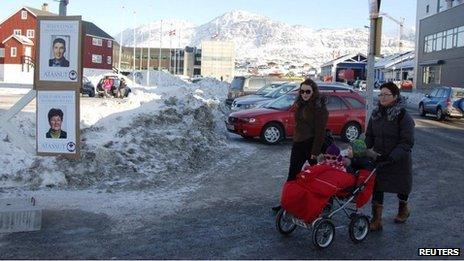Mining question dominates Greenland poll
- Published

Voters go to the polls in Greenland on Tuesday, in an election dominated by the question of how the territory should exploit its mineral riches.
Nearly 70% of 57,000 inhabitants are eligible to vote in Greenland, a Danish territory with partial autonomy.
Many are keen to reduce reliance on Denmark's annual subsidy worth $576m (£387m).
Iron, uranium and rare earths lie underground, but opinions differ over how to extract them.
The latest poll predicts a tight race between the governing left-leaning Inuit Ataqatigiit party (IA) and the opposition Siumut party, reports the BBC's Malcolm Brabant from the Danish capital, Copenhagen.
They will be fighting for 31 seats in a home rule government.
There is only one polling station in the capital, Nuuk - a town of 15,000 with only two traffic lights.
China looks on
The IA - headed by Prime Minister Kuupik Kleist - is in favour of importing cheap, foreign, mainly Chinese labour to mine iron ore.
Siumut - led by Aleqa Hammond - is opposed to the plan, which could see Greenland's population increase by 5%.
The election will be monitored in China, which wants Greenland's iron for its expanding economy, and in turn by European Union officials who have expressed concern about China's influence in the territory.
Australia's Greenland Minerals and Energy Company, which is prospecting for uranium and rare earths used in computers and mobile phones, will also be watching closely.
Ways of life have been thrown into flux in Greenland as sea ice thaws and new shipping routes into the Arctic open up.
As well as untapped mineral wealth worth billions of dollars, the territory may also have offshore oil and gas reserves.
But the sparse mostly Inuit populations dotted along the coastline find that ice floes are often so thin that hunters can no longer use dog sledges, reports say.
There are concerns that opening up Greenland's resources for exploitation may pose an additional threat to the environment and traditional ways of life.
- Published15 January 2013
- Published23 May 2013